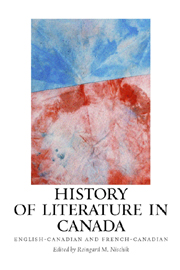Book contents
- Frontmatter
- Contents
- Acknowledgments
- Introduction: Writing a History of Literature in Canada
- I Beginnings
- II The Literature of New France, 1604–1760
- III The Literature of British Canada, 1763–1867
- IV From the Dominion to the Territorial Completion of the Nation, 1867–1918
- V The Modern Period, 1918–1967
- VI Literature from 1967 to the Present
- 21 Sociopolitical and Cultural Developments from 1967 to the Present
- 22 English-Canadian Literary Theory and Literary Criticism
- 23 The English-Canadian Novel from Modernism to Postmodernism
- 24 The English-Canadian Short Story since 1967: Between (Post)Modernism and (Neo)Realism
- 25 English-Canadian Poetry from 1967 to the Present
- 26 Contemporary English-Canadian Drama and Theater
- 27 Canons of Diversity in Contemporary English-Canadian Literature
- 28 Literature of the First Nations, Inuit, and Métis
- 29 The Quebec Novel
- 30 The French-Canadian Short Prose Narrative
- 31 French-Canadian Poetry from 1967 to the Present
- 32 Orality and the French-Canadian Chanson
- 33 Drama and Theater from the Révolution tranquille to the Present
- 34 Transculturalism and écritures migrantes
- 35 The Institutionalization of Literature in Quebec
- Further Reading
- Notes on the Contributors
- Index
22 - English-Canadian Literary Theory and Literary Criticism
from VI - Literature from 1967 to the Present
Published online by Cambridge University Press: 12 September 2012
- Frontmatter
- Contents
- Acknowledgments
- Introduction: Writing a History of Literature in Canada
- I Beginnings
- II The Literature of New France, 1604–1760
- III The Literature of British Canada, 1763–1867
- IV From the Dominion to the Territorial Completion of the Nation, 1867–1918
- V The Modern Period, 1918–1967
- VI Literature from 1967 to the Present
- 21 Sociopolitical and Cultural Developments from 1967 to the Present
- 22 English-Canadian Literary Theory and Literary Criticism
- 23 The English-Canadian Novel from Modernism to Postmodernism
- 24 The English-Canadian Short Story since 1967: Between (Post)Modernism and (Neo)Realism
- 25 English-Canadian Poetry from 1967 to the Present
- 26 Contemporary English-Canadian Drama and Theater
- 27 Canons of Diversity in Contemporary English-Canadian Literature
- 28 Literature of the First Nations, Inuit, and Métis
- 29 The Quebec Novel
- 30 The French-Canadian Short Prose Narrative
- 31 French-Canadian Poetry from 1967 to the Present
- 32 Orality and the French-Canadian Chanson
- 33 Drama and Theater from the Révolution tranquille to the Present
- 34 Transculturalism and écritures migrantes
- 35 The Institutionalization of Literature in Quebec
- Further Reading
- Notes on the Contributors
- Index
Summary
“Where is Here?”: Literary Nationalism in the 1960s and 1970s
WHILE AT THE BEGINNING of the twentieth century literary theory and criticism had been busy tackling the question of whether there was a genuinely Canadian literature at all, a new cultural self-awareness arose in the late 1950s. As internationally Canada was poised between the traditional model of Great Britain and the overwhelming cultural, economic, and political influence of the United States, cultural unity and selfconfidence in its own literary and cultural achievements developed slowly. Unlike the United States, Canada lacked founding myths and master narratives that could be applied to the nation as a whole because of the intranational dualism of English Canada and Quebec. Anglophone literary theory in the 1960s has to be understood as a reaction to both Quebec's Quiet Revolution, which triggered social reforms and sparked nationalism in Quebec, as well as to the publication of the Massey Report (1951), which displayed anti-American tendencies and conjured up a new Canadian nationalism, especially in English Canada. The Massey Report — named after its chairman Vincent Massey (1887–1967) — was the work of an independent committee that advised the Canadian government in the improvement of the arts, letters, and sciences. It maintained that from the time of the Second World War Canada's national identity had neither been threatened by economical nor political forces but instead by the predominance of a commercialized U.S. American mass culture. This cultural critique caused a stir in Canada and in 1957 gave rise to the foundation of the Canada Council.
- Type
- Chapter
- Information
- History of Literature in CanadaEnglish-Canadian and French-Canadian, pp. 291 - 309Publisher: Boydell & BrewerPrint publication year: 2008



